Monday, 20 June 2011
Distance 26 km
Duration 5 hours 30 minutes
Ascent 377 m, descent 200 m
Map 142 of the TOP100 lime-green series
The night had been miserable for us both. Keith had severe diarrhoea and spent the hours of darkness hurrying to and fro to the toilets, which were a good 200 metres from our tent, as we had chosen our spot before he was struck down. I lay awake with pains in every part of my body, wishing that I could be at home, tucked up in front of the fire under a doona, instead of facing a month of arduous outdoor adventure.
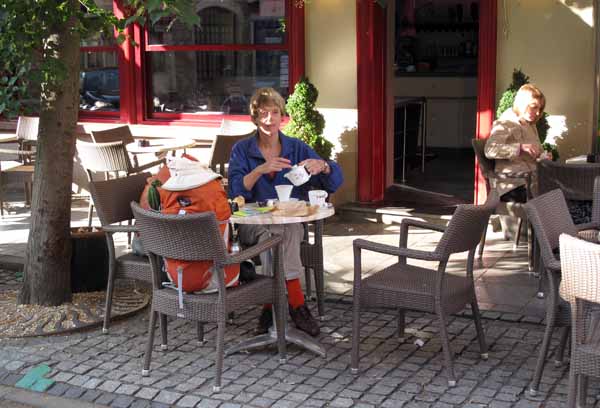
Nevertheless it did not occur to either of us to delay our departure, to stay a few days in the relative comfort of Cluny, where meals and a place to sleep could be guaranteed. The only deviation from our usual routine was that we had breakfast at a café in the town instead of gulping down a bowl of muesli, and that was only because we had forgotten to buy any powdered milk.
We left the camping ground at 7:30, crossed the D980 and were soon in town, where the Café de Paris had just opened its doors. It was a delightful summer morning and we ate our croissants and pains aux raisins outside.
Unfortunately, one of the side-effects of the ‘flu was that coffee tasted horrible to me, so I ordered tea – I didn’t know whether it would even be available in these parts, but of course it was. It was lovely to be back in provincial France, where the locals come to the same bar at the same time every day of their lives, and there is a great deal of kissing and hand-shaking (not involving us, however).
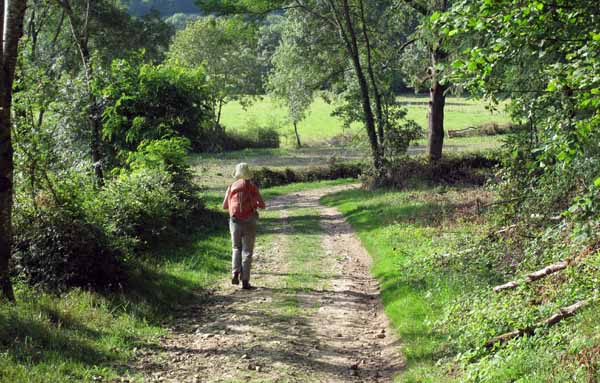
With enthusiasm renewed, we set off up the street, turned into the Rue Ste-Odile and climbed to the top of the old town, squeezing around the roadworkers who were filling the whole narrow street with their machinery and rubble.
It was steep but I felt strong and lively, which was a surprise. At the top we went through a portal, partly ruined but still grand, and picked up the red and white marks of the GR76.
Following these signs, we descended into the expansive basin of the river Grosne, with cropland on the lower slopes and forest above. Over the river we could see the TGV line and the great gash of the autoroute.
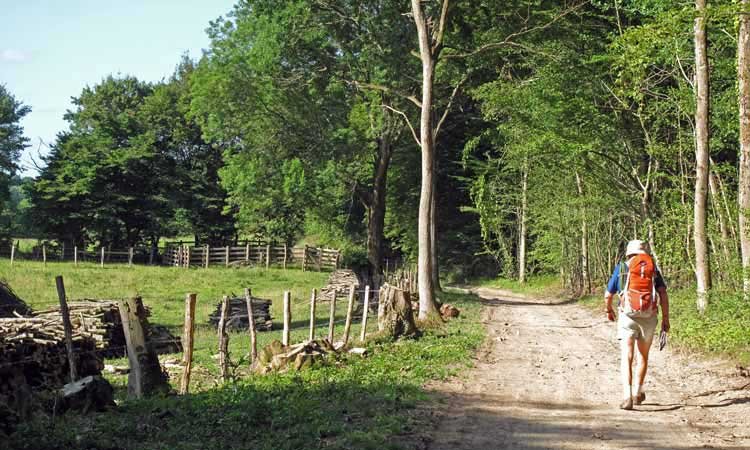
Our road became a wandering track and we felt far from civilisation although we were nothing of the kind.
When we got to the highway at Sainte-Cécile, the GR crossed over and continued along the opposite slope, but by that time I was fading, my initial feeling of strength having only lasted a few kilometres.
We decided to take the low road beside the river, the D987, in the hope that the village of Clermain would offer refreshments. All the traffic was on the adjacent highway so it was a pleasant enough walk, and the day was so warm that we had to stop while I changed into shorts. We didn’t know it then, but that was one of the few times of the whole trip when I was able to walk in shorts.
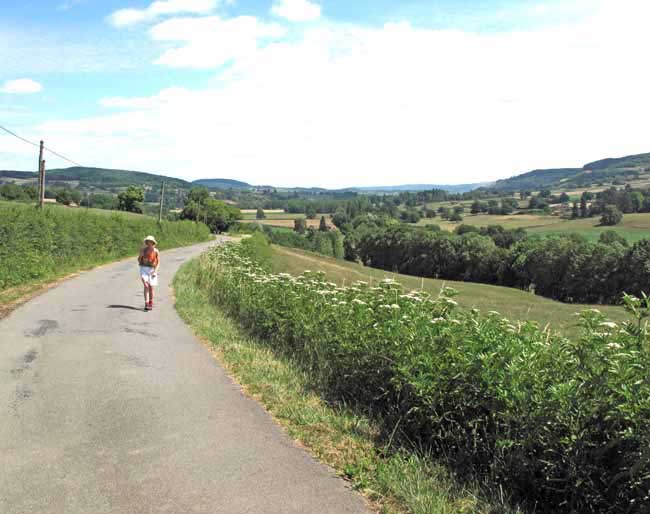
Clermain turned out to have the hoped-for bar and we went in gratefully for another round of tea and coffee, in company with various truck drivers from the highway.
The road that we had walked on was the old highway, going right through the village, whereas the new one bypassed it, but there was an elaborate access system from new to old, saving the village from extinction.
From here we crossed the highway on an overpass and continued along the D987, which turned south, still following the valley of the Grosne with its patchwork quilt of fields.
After a kilometre or so, just before the bridge, we took a tiny road to the right, parallel to the D987 and rather hillier, but completely devoid of cars. The only traffic that we came across was a man pushing a barrow of hay.
We passed a few fine old farmhouses and cut through a wood before we came out at the village of Trambly. Despite the refreshments at Clermain, my pace had decreased to a shambling plod and Keith was constantly having to wait for me to catch up.

Trambly did not have a promising air. We walked the length of the village – a ribbon of houses clinging to the road above the valley – before noticing a small hand-writted sign “BAR”, with an arrow pointing to the right. Much to our surprise, there really was a bar – plain and drab from the outside – and, even more surprisingly, it was open, although it was a Monday. We went in, more for the sake of the seats than for the drinks.
In our mode of travel, sitting up comfortably at a table is a pleasure in itself, and there are always interesting things to look at in a bar, such as signs, posters, pictures and other decorations, not to mention other people.
In this dark little bar there was only one other drinker and the taciturn barman, whom I nevertheless asked about where we could eat in Matour on a Monday. He said there were plenty of places to choose from, which was reassuring. Were we travelling by car, or cycling? When I replied that we were on foot, his face was a study in polite horror.
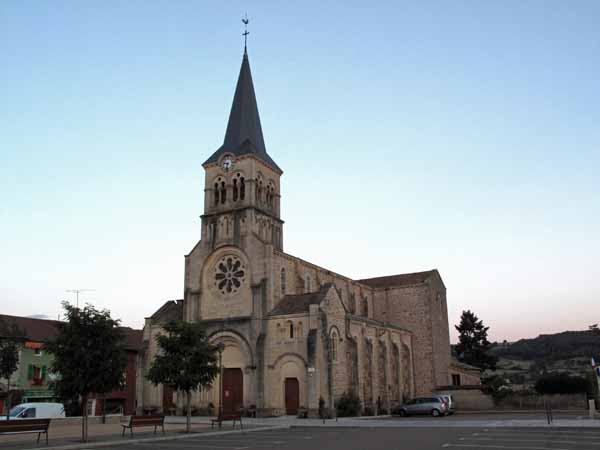
Out on the road again, we soon came to the place where a walking path led off up the hillside. We had intended to take this route to Matour but in view of my pathetic lack of stamina, we stayed on the road, the shortest way to our destination. It was only about five kilometres and the countryside was beautiful, but I got slower and slower. The last pull up to the town was character-building.
We had visited Matour by car a few years earlier and had failed to find anywhere to eat except for a punishingly expensive gourmet restaurant (Christophe Clément), but this time things looked better.
Apart from Chez Clément (which was closed on Mondays, not that we would have gone there anyway), we saw a pizzeria and another restaurant, as well as two defunct ones.
All faced onto the square with its handsome church, and there was a little supermarket and other shops. Our only worry was whether the camping ground would be functioning. It was nearby, a couple of streets down towards the river, and we were relieved to see it full of life. There was even a snack bar, although it was closed when we arrived (and never re-opened).
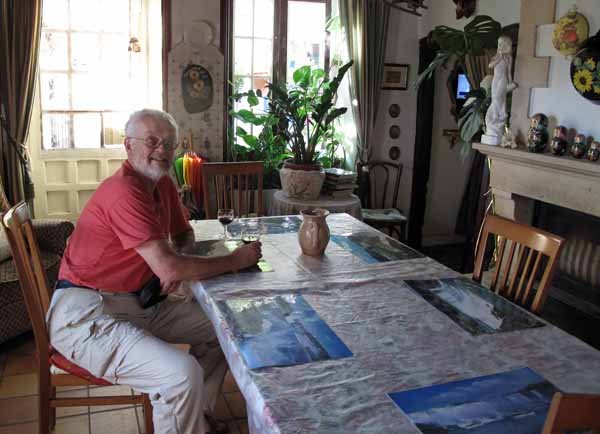
After a lunch of bread and steak (the one I had not eaten last night), we set up our tent and I collapsed onto my sleeping mat, where I stayed for the entire afternoon.
I was incapable of anything as mentally strenuous as reading, but I enjoyed the pantomime of our Dutch neighbours, who spent hours washing and polishing their caravan, going over each other’s work with forensic zeal. It had to be spotless for their departure in the morning.
Keith roamed off to explore the town and came back with the good news that he had seen someone working inside the pizzeria, so that at least would be open. He had also bought some powdered milk and fruit for our breakfast.
At 7:30 we walked back to town for dinner. The pizzeria was closed, the other restaurant was closed, and the supermarket had just closed.
We stood in the empty church square, trying to resign ourselves to a dinner of muesli and water in our tent. Then we noticed a small sign on a house – “Chambres d’hôte” – so we knocked on the door and presently an old woman appeared. I boldly asked her whether she could provide us with a meal, since none of the restaurants in Matour were open, and she agreed, but warned us that it would take a bit of time to prepare. She showed us into her sitting room to wait with a jug of wine while she busied herself in the kitchen.
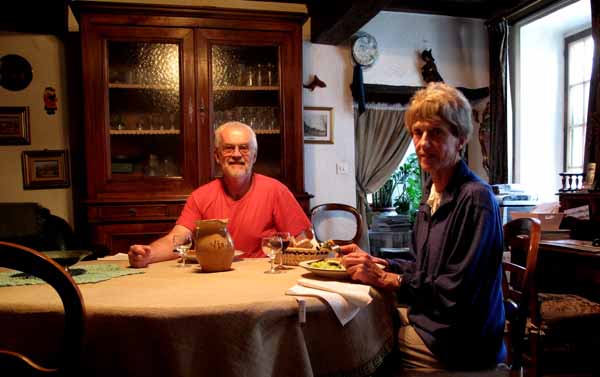
The sitting room opened directly onto the street and was stuffed with furniture, knick-knacks, family photographs and pot plants, all bathed in dim light. The floor was flagged and there was a big fireplace and heavy roof beams. Madame had lived in the area all her life and one of her daughters was the local baker, which was convenient as there was no bread in the house. A short phone call brought a rosy-cheeked grandson to the door with a baguette.
When dinner was ready, we moved to the formal parlour, another dark room crowded with treasures. I had said that the simplest of meals would be sufficient, and we were duly presented with a slice of goat-cheese quiche resting on salad leaves.
In my weakened condition I found that more than enough, but it was only the beginning. Madame then brought a dish of chicken, a ratatouille, a gratin dauphinois, another salad and of course a basket of bread. Not only that, but she decided to sit with us as we ate, so my plan – to slip as much as possible into a plastic bag and keep it for lunch tomorrow – was thwarted. The best I could manage was to smuggle a few slices of chicken into the bag while her attention was on Keith.
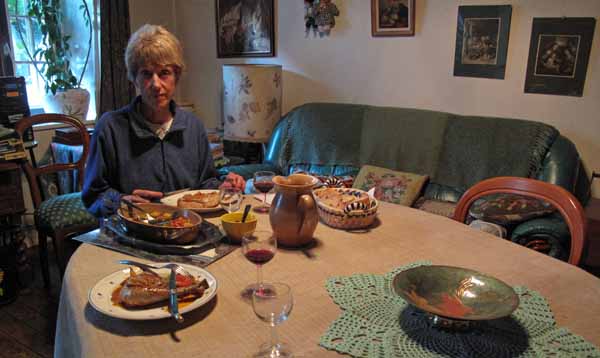
She was a thorough countrywoman, her whole life centred in the village and her family. She had never been to Paris and had no need to.
We found out about her husband, who had died a few years before, her five grown children and her ten grandchildren as well as the perfidy of various neighbours, shop-keepers and the local council. Keeping up with this torrent of French taxed my brain but it was wonderfully entertaining and took my mind off my bodily weakness.
After the main course we had soft white cheese with sugar, the sort of invalid food that I could face. When it came time to pay (€34), we gave her €40 but she only had about €4 of small money, so she gave us two cans of beer to make up the difference. We parted company with a warm embrace, knowing that we would never see each other again.